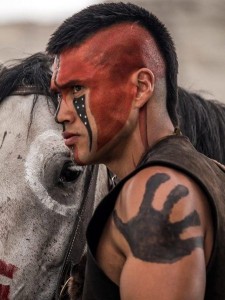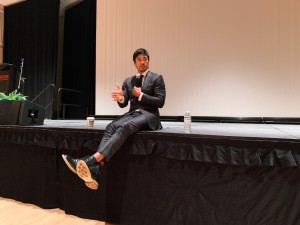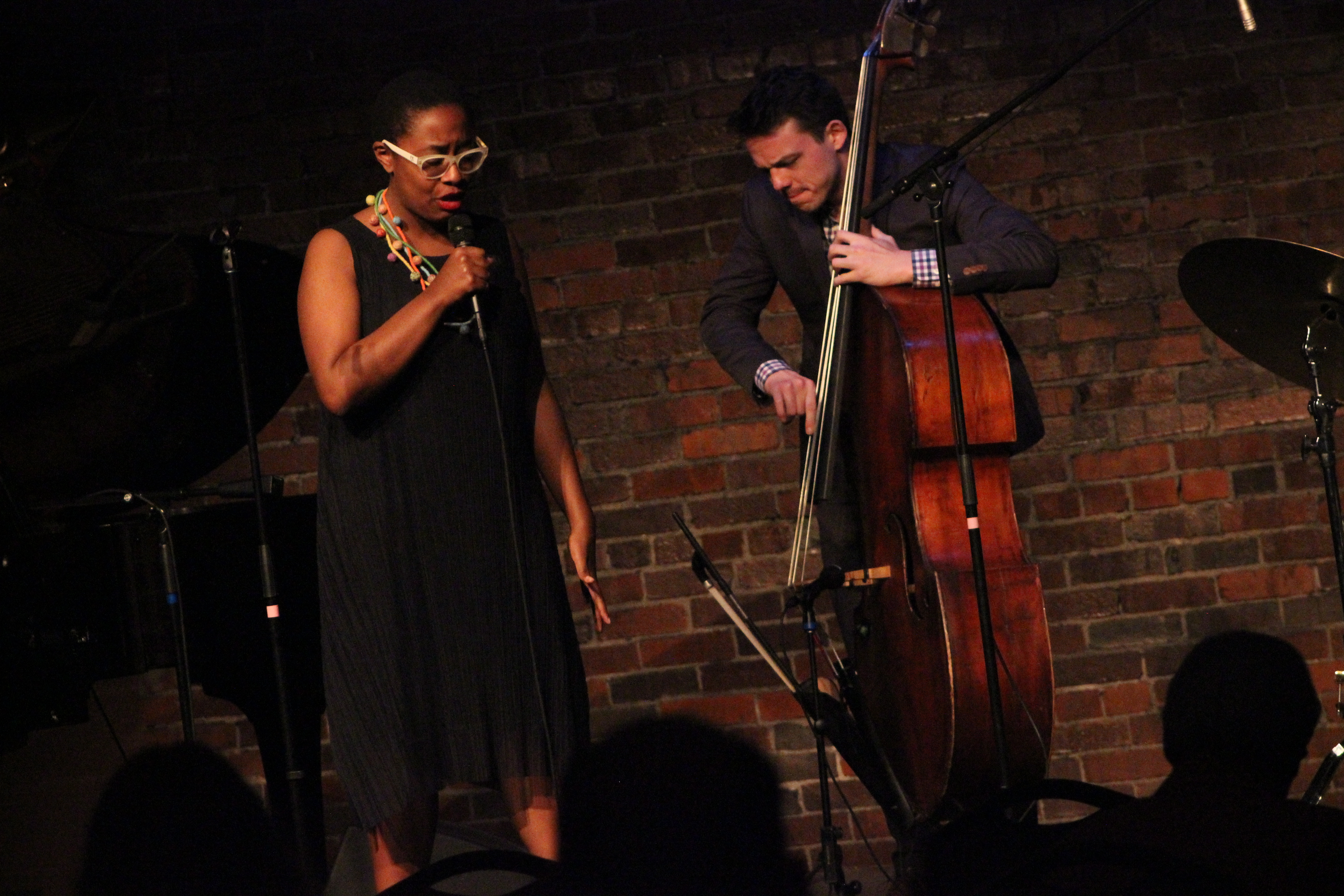“We’re still here.” Indigenous Actor and Activist Martin Sensmeier Visits FSU
On Tuesday, Nov. 12, Indigenous actor and activist Martin Sensmeier visited Frostburg State University (FSU). After leaving behind the sunshine in L.A., Sensmeier was greeted by FSU’s first snowfall of the semester, along with a warm and welcoming audience.
Sensmeier is best known for his roles in The Magnificent 7 with Denzel Washington, HBO’s Westworld, and Wind River.

Source: Samish Leather.
His most recent project involves executive producing Bright Path: The Jim Thorpe Story, alongside producers Angelina Jolie, Steve Tisch, and Todd Black. Although the full cast has yet to be announced, Sensmeier will star as Thorpe.
The synopsis of the film on www.brightpathmovie.com states, “A young Native American struggles to hold onto his identity in the face of a nation that attempts to strip him of his culture. Spurred on by the last words his father ever spoke to him, ‘Son, you’re an Indian, I want you to show other races what an Indian can do,’ Jim Thorpe transcends every obstacle to become a beacon of hope for his people and ‘The World’s Greatest Athlete’.”
Sensmeier also participates as an ambassador for The Native Wellness Institute, along with the Boys & Girls Clubs of America. He continues to advocate for the wellness of Native people of all Nations, with a primary focus on youth.
Sensmeier was born in Anchorage, Alaska and grew up in Yakutat. He is of German-Tlingit and Koyukon-Athabascan descent. “I come from a small town in Alaska of less than 600 people. It’s a small fishing village, half-Native community, half mostly white. It’s a really nice, little town,” Sensmeier said.
He went onto discuss the time he spent working in an oil rig and traveled to LA periodically. “I went to college in Anchorage, Alaska. I spent five years working in an oil rig before moving to LA in 2007 to pursue acting, where I enrolled in my first acting class.”
Sensmeier recalled his first major audition for a role in the second movie of The Twilight Saga, New Moon, “I got so excited, it was crazy. I was daydreaming about how my life could change. I prepared really hard. I worked on my audition, I worked with my partner from acting class, I studied my lines. I memorized everything, I was like, ‘yeah, I got this.’ It’s funny because on my way there, I started getting nervous. And by the time I got there, I was shaking. My heart was beating really fast, thinking about everything in my daydreams. And then I got in there and forgot my lines. The casting director is really sweet, she let me audition with the lines in front of me. I got through it, but I sucked. I was really, really bad – horrible. I was devastated.”
Although, he is thankful for this failure, along with other failures in his life saying, “Failure is not the opposite of success, it’s a part of success. I’ve always believed that you can’t succeed until you fail. If you don’t suck at something, you’re not even trying. Basically, my life is built on a lot of failures. It’s all these things I’ve tried and didn’t work out. School was one of them, but that doesn’t mean I didn’t get a lot out of it. And I don’t recommend ever dropping out of school, because you need your education. Looking back, I wish I would’ve finished. I could have and still do what I do today, that’s just the road I took.”

“So, I stuck with the LA thing, everyone should have dreams and goals. Where I come from, the Yakutat is a small community with little opportunity. And the community that my Mom came from is a smaller community with even less opportunity. Growing up, when you have crazy ideas like, ‘Oh, I wanna go to Hollywood and become an actor,’ people laugh at you, and I got laughed at. People who I worked with in the rig would ask me, ‘What do you do in your off time?’ ‘I’m in LA, taking acting classes.’ ‘Oh, that’s funny, your new nickname is Hollywood.’ Whenever you want to pursue something where, in your mind, seems unrealistic, you still want to pursue it. You might have a passion for it, it might burn inside of here and you feel it. If you feel that, you have to pursue it, whether it’s going to work out or not. You never waste time pursuing your dream. Ever,” Sensmeier said.
He added, “LA has chewed me up and spit me out a couple of times. I quit working the rigs in 2011. I worked odd jobs here and there. LA is a tough place, it’s fast and unforgiving. It has sent me home, sent me packing. I went to Seattle and stayed with my brother for a bit. He’s the one who got me back on my feet, encouraged me to go back. I’ve always had people that encouraged me. In the acting business, you fail all the time, non-stop. The more failures you get out of the way, the more times you’re going to get to the successes. That’s what I focus on. Try it and fail at it. Don’t be afraid to fail, that’s growth; it forces you to be uncomfortable. Being uncomfortable isn’t a bad thing; if you’re uncomfortable, you’re trying at something. It’s okay to be uncomfortable.”
“Being a Native American, I’ve never looked at that as something that holds me back. It’s amazing how these opportunities present themselves; I just seize these opportunities. Believe in yourself. Believe in your ability. Whatever it is you want to do, believe in that and pursue it.”
Sensmeier answered questions from the audience before concluding the night with a meet and greet.
Before leaving FSU, Sensmeier participated in a brief interview with The Bottom Line (TBL).
Q: What does being Indigenous mean to you?
A: “For me, I think being an Indigenous person is having a connection with my land, with my culture, our traditional foods, having an understanding of the history, and being involved in the community. I think these are all important aspects of being Indigenous.”
Q: Can you recall a typical day of life in Anchorage?
A: “When I was living in Anchorage, an average day involved working for eight hours, going to the gym after work, playing basketball, it depends. And then, you have cultural events that happen throughout the year. You participate in them, whether it’s your dances or whatever you’re going to share culturally. A lot of them are social events, you go there and interact with people from other tribes. It’s a beautiful sharing of culture, it’s a big part of it. A lot of times, everyone [non-Native] is welcome.
Q: Can you describe Bright Path: The Jim Thorpe Story? Is there a release date yet?
A: “The story is about Jim Thorpe, who was from the Sac and Fox Nation tribes of Oklahoma, he was also Irish and French. He was an Olympian and competed in the 1912 Olympics. He won two gold medals, became a commissioner of the NFL and played professional baseball. But, he was also stripped of his Olympic gold medals for participating in amateur baseball before he went to the Olympics. Which, a lot of athletes did, but they just changed their names. Jim kept his name because it was Jim. He attracted a crowd, he would sell out everywhere he went. In 1983, his Olympic medals were restored because they found something wrong in the rules that actually contradicted why they stripped the medals. But, that was a devastating point in his life, nonetheless. We didn’t become citizens of the United States until 1924 when we were granted citizenship. So before that, we were considered less than human. So, he could go and represent his country, yet, come back and not even be a citizen. Jim was an amazing person who did a lot of incredible things in his life, so I’m honored to be able to help tell his story. With that being said, there’s no release date yet. They’re actually in the developmental stages of writing the script and finding the right team. The project is funded, it’s going to get made– hopefully, next year.”
Q: Is there anything you would like readers know about Native Americans?
A: “We’re still here. You’re probably on Native land right now. So, in knowing that, research the history of the land you’re on and the people that were there. They’re probably still there. Educate and try and meet some Native Americans. Every tribe in different parts of the country have different cultures that are specific to that area and have grown out of that area. The culture is as natural as the trees, rivers, and streams that are there. It’s beautiful to see that. As an outsider, you get some opportunities to attend socials or events where you can interact, participate, or be a part of the tribe. It’s a beautiful thing to be a part of, a beautiful thing to share. Most tribes are willing to share their culture.”
Q: What is your vision for the representation of Native Americans within the next five years?
A: “I hope there is a more positive and accurate representation of Native Americans. Current storytelling is important. There are people and athletes out there who represent and share their stories. I always make a genuine effort. Whether it’s educating people through a speech or through casting experience, I try to offer my advice for areas of improvement. For acting roles, instead of just saying, “no”, I do make an effort to offer ideas to make the project better. Whether I say “yes” or “no,” they’re usually still going to make it. Although, I want it to be good for their sake and for the people’s sake. I don’t think we should deprive the truth of a collective mass of people. That has happened for so long, hiding the truth and misrepresenting the truth. That’s why it’s called history, it’s “his story”. That’s our past, but it’s not our history. History is something that’s gone, it’s no longer. We’re not history; we’re still here. We have a past and right now, we’re making history.”
To get involved, visit:
https://www.nativewellness.com/
http://www.ncai.org/tribal-directory/tribal-organizations


